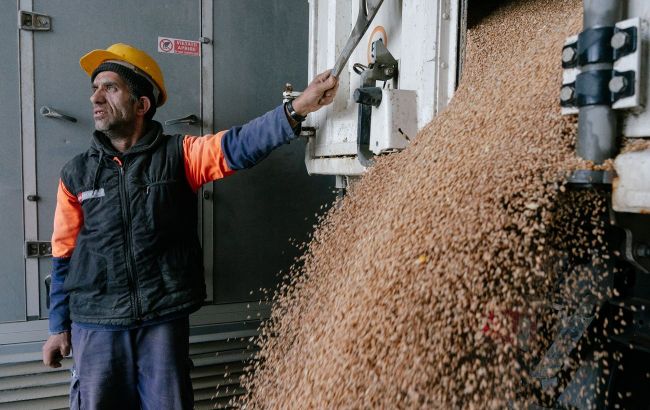Russia attacks Ukrainian ports, EU blocks exports: How Ukraine seeks ways to export grain
 It is difficult for farmers to export grain (Photo: Getty Images)
It is difficult for farmers to export grain (Photo: Getty Images)
Russia continues its attempts to destroy Ukraine's port infrastructure in order to halt the export of agricultural products. At the same time, the overland route through the EU is almost halted due to logistical issues, and neighboring European countries have imposed an embargo on the import of Ukrainian grain. For more details read the RBC-Ukraine article.
Ukraine is facing serious problems with agricultural exports. There is a significant risk that, despite having a good harvest of grains and other agricultural products, the country may simply be unable to sell them in the necessary volumes.
The issue lies in the routes that farmers use to export their products abroad. The grain corridor involving Russia has not been operational since mid-summer, the Danube ports, which significantly increased cargo turnover this year, are under attack by Russians, and the EU has decided to continue blocking Ukrainian agricultural exports.
"The forecast for the harvest had to be changed several times. But from what farmers planned to export, we can currently only export up to 45%. This means that businesses won't have the funds for the next planting campaign and for purchasing everything they need: seeds, fertilizers, fuel, etc.," one official familiar with the grain export situation told RBC-Ukraine.
According to the National Bank of Ukraine, losses from the ban on exports to neighboring countries, if it persists until the end of the year, could amount to up to $600 million. However, the NBU emphasized that Ukrainian suppliers supposedly managed to find alternative markets, which they can use if the ban is not lifted by September 15.
Nevertheless, based on the latest information, there is little reason to expect the lifting of the ban on importing Ukrainian goods by neighboring countries, particularly Poland, and the resumption of the former grain corridor. Polish Prime Minister Mateusz Morawiecki has already announced that the ban will be extended. Negotiations on the restoration of the grain corridor have hit a dead end, and according to RBC-Ukraine, Kyiv no longer sees this option as viable, at least in the form it existed until mid-July.
Ports are Russia's target
Export problems for grain began at the outset of active hostilities by Russia. Grain supply via the Black and Azov Seas practically ceased in February of last year. The ports of Mariupol, Skadovsk, Berdyansk, and Kherson came under the control of aggressors, and they were closed by order of the Ministry of Infrastructure in May of the previous year.
Ukraine lost almost 90% of its agricultural exports that went by sea. As a result, there was a global grain shortage, causing prices to rise by 30%, especially affecting developing countries, particularly in North Africa and the Middle East, where there was a threat of famine. The UN called the situation catastrophic and urged finding solutions as quickly as possible.
In July 2022, Ukraine and Russia signed a grain deal with the UN, which temporarily allowed the resumption of exports. During that period, Ukraine accumulated over 20 million tons of grain for export.
The grain corridor worked with interruptions because it was blocked by the Russian side from the very beginning. Meanwhile, Ukraine increased grain exports to European countries by land and engaged the capacities of Ukrainian ports on the Danube.
Realizing that the Danube ports partially solved Ukraine's problem, Russians began to destroy them at the end of this year's summer. Local port infrastructure became a repeated target for Russian drones, and their wreckage was found even in Romania.
Ukraine's economic losses from the export blockade are a significant goal for Russia, but not the only one. In the Kremlin's attempt to destroy the key river route for Ukrainian farmers, they essentially want to create conditions where Ukraine will be forced to transport grain only by sea. In that case, Kyiv, the UN, and Western partners of Ukraine, according to Russian logic, should become more accommodating regarding the grain corridor and accept Russia's conditions for its resumption.
Moscow has already tried to negotiate the lifting of sanctions in exchange for opening access to the global market for Ukrainian grain. In March 2023, Russia agreed to extend the agreement for 60 days but stated that future exports would depend on how well its demands were met.
Russia has sought an increase in the export of its agricultural products, the lifting of sanctions against Rosselkhozbank, and the resumption of the operation of the Tolyatti-Odesa ammonia pipeline. It is also known that the Kremlin wants to see the cancellation of some of the sanctions related to restrictions on the supply of Russian oil to third countries through EU ports.
The conditions of Russia were discussed at the level of the UN leadership but did not yield any results. In mid-July, Russia announced its withdrawal from the grain deal. Since then, according to information from RBC-Ukraine, Ukraine has not received any substantive proposals for the extension of the agreement from the UN or other intermediaries.
In August, an alternative route for exports was opened, without Russia's involvement. This route passes through the sovereign waters of Ukraine, Bulgaria, Romania, and Türkiye. Several ships have already used this route, and Ukraine has high hopes for it. Essentially, it can replace the grain initiative, which has failed, especially when combined with increased grain exports overland. The volumes of shipments through this route will be somewhat smaller than the old corridor, but they will be more guaranteed since Russia is not involved. Currently, grain shipments by land are relatively small due to high logistics costs.
The Turkish side is still studying the prospects of the new route. "The proposal for working (of the grain corridor - ed.) without Russia has been handed over to the Turkish side. There is no final confirmation yet. But since ships (with grain - ed.) are already passing through the territorial waters of Romania, Bulgaria, and Türkiye without restrictions. This is actually a rational path," said Ukraine's ambassador to Türkiye, Vasyl Bodnar, on September 7.
As of today, according to RBC-Ukraine, Ankara has not given a final response. However, Ukraine hopes for a positive outcome, as it is advantageous for Türkiye to participate in the transit of Ukrainian grain, and negotiations between Recep Tayyip Erdogan and Putin on the continuation of the former grain initiative in early September did not yield results.
As for the Danube ports, they will still be involved, but apparently not to the same extent as in recent weeks. Europe is ready to work with this route. At the end of August, the Croatian side confirmed its willingness to provide Danube and Adriatic Sea ports for the transportation of Ukrainian grain.
"Ukrainian grain has already been exported from Croatian ports. This trade route, although niche, is already popular. We are ready to develop it, expanding the possibilities of the transport corridor," said Deputy Prime Minister Yulia Svyrydenko. Transit details are also being discussed with the Romanian side.
Trade restrictions with neighbors will continue
As a result of the increased supply of Ukrainian grain by land, trade restrictions have been imposed by neighboring European countries such as Poland, Bulgaria, Hungary, Romania, and Slovakia.
Poland was the first to speak about the need to ban the import of goods from Ukraine earlier this year. Warsaw imposed an embargo on Ukrainian wheat, corn, and oilseeds for five months starting on April 15. Bulgaria, Hungary, Romania, and Slovakia followed with similar restrictions.
The reason is that due to the increase in transit, some Ukrainian goods were staying on the domestic markets of these countries, leading to lower prices for local producers. This, in turn, resulted in losses for farmers in those countries. Part of the restrictions by Poland, which were coordinated with the European Commission, were applied for political reasons - to gain more support for the ruling party in the upcoming elections scheduled for mid-October, as stated in April of the previous year by the Ministry of Agrarian Policy of Ukraine.
But the reason is not only political. After the increase in the transit flow of grain, it was found that Poland's infrastructure could not cope with the export of grain. Problems also arose in terms of customs coordination between the two countries. Additionally, it's important to consider the factor of Polish businessmen who were storing grain in anticipation of price increases. However, prices did not rise, and grain stocks remained significant. Moreover, Ukrainian grain that was supposed to be transshipped through Poland ended up staying there due to transshipment problems.
"I think that in reality, this is more about the abuse by unscrupulous businessmen, including within the territory of Poland, who sometimes buy (grain - ed.) at a low price and then dump it on the Polish market," said Anatolii Tochynskyi, Deputy Minister of Foreign Affairs.
According to Ukraine's trade representative, Taras Kachka, Polish farmers simply hoarded grain and wanted to sell it after the price increased.
"Poles do not want to admit that farmers hoped for prices as high as in 2022," Kachka said. He believes that the current drop in grain prices is due to large stockpiles in warehouses and the lower quality of the new harvest due to rains.
"But Poland's determination to find arguments to continue the ban distorts the possibility of continuing the discussion. Regardless of what our Polish colleagues say, they have plenty of arguments artificially tailored to justify the ban," Kachka said.
He noted that even after the ban on Ukrainian products, prices in the Polish market did not change. Kachka is convinced that Ukrainian products have not caused any harm to the Polish market.
Warsaw has already stated that regardless of the European Commission's position, the ban on the export of Ukrainian products will be extended after September 15. Moreover, Poland wants to expand the list of items under the embargo, including frozen strawberries and raspberries.
The Minister of Agriculture of Hungary has announced that Budapest has agreed to an embargo on Ukrainian grain with Romania, Slovakia, and Bulgaria. However, on September 14, it became known that Bulgaria reconsidered the impact of Ukrainian exports on its domestic market and decided not to continue the ban since no harm was found. Romania only announced plans to increase the transit of Ukrainian grain.
If the embargo is extended, the EU may subsidize the transit of Ukrainian grain to Baltic ports at a rate of 30 euros per ton. "These funds - a total of 600 million euros - will come from the EU budget. The condition for their allocation will be Ukraine finding recipients for its products in third countries," said Janusz Wojciechowski, EU Commissioner for Agriculture.
Despite the fact that the imposed ban violates the EU's free trade agreement, Ukraine has not resorted to retaliatory measures. "It is not the time for trade wars," said one of the officials in the government's economic bloc.
The Ukrainian government does not want to worsen relations with Poland, which provides significant support to Ukraine in the war. "There is a very important political context here because Poland is a friendly country and Ukraine's closest partner and ally," said Deputy Prime Minister Olha Stefanyshyna. However, involving Ukraine's agricultural sector in the political process in Poland, especially given Ukraine's wartime situation, is a "very sad story in these economic, political, and military conditions," she noted.
The only response from Ukraine's side may be to turn to the World Trade Organization for compensation for losses due to violations of the General Agreement on Tariffs and Trade. The government has promised to take this step if neighboring countries continue the embargo after September 15.

